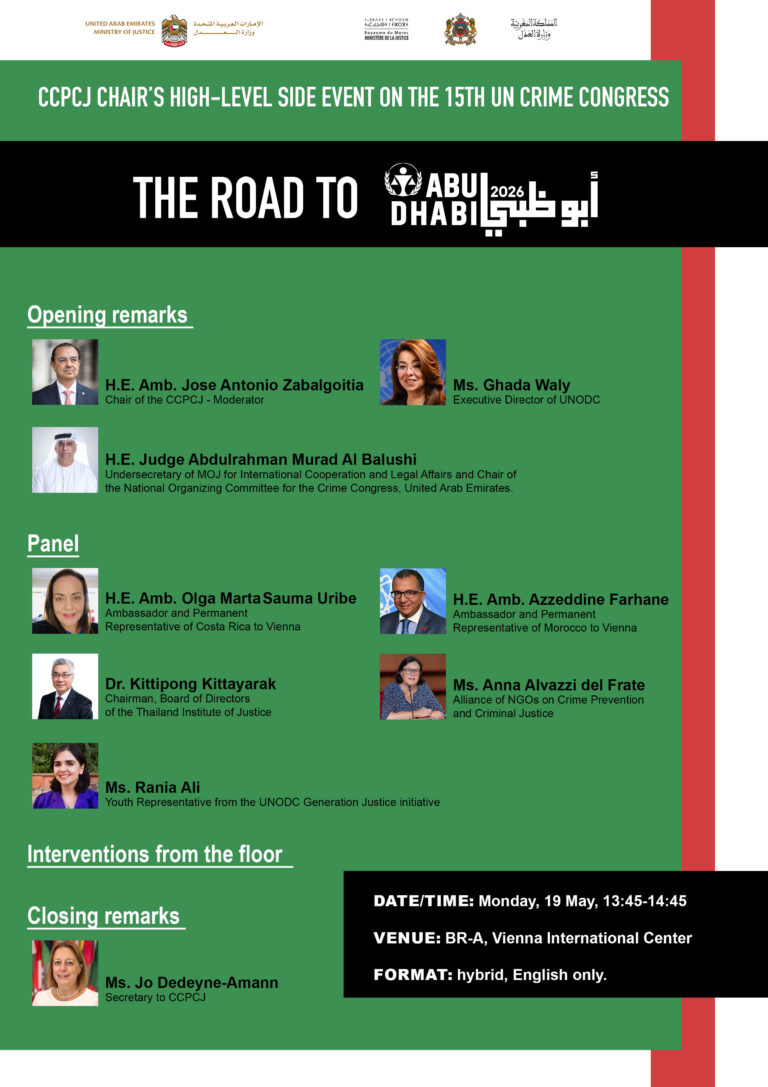
The IIJ at CCPCJ34 Side Events: Strengthening Engagement Through Side Events
The IIJ participated online in a series of high-level side events during the 34th session of the Commission on Crime Prevention and Criminal Justice (CCPCJ34), held from 19 to 23 May 2025, in Vienna. The side events brought together Member States, international organizations, and civil society actors to address evolving global challenges in crime prevention, justice reform, digital resilience, and international cooperation.
The institute’s participation reflects its ongoing commitment to contributing to global policy dialogue and capacity building in the rule of law and criminal justice sectors. It also served as a valuable platform for exchanging insights and best practices on transnational threats, data-driven justice strategies, and multilateral cooperation.
As the IIJ deepens its engagement with the CCPCJ community, these opportunities help strengthen collective efforts to promote human rights-compliant approaches to criminal justice and counter-terrorism.
The IIJ looks forward to building on this momentum and contributing to the global roadmap ahead of the 15th UN Crime Congress in Abu Dhabi.
The IIJ participated online in the following side events:
1. The Road to Abu Dhabi: CCPCJ Chair’s High-Level Side Event on the 15th UN Crime Congress; organized by the Chair of the Commission on Crime Prevention and Criminal Justice (CCPCJ) with the support of the United Arab Emirates, Morocco and the UNODC Secretariat to the Governing Bodies. Chaired by H.E. Ambassador Jose Antonio Zabalgoitia, Permanent Representative of Mexico to the UN in Vienna, the side event served as a strategic milestone in the lead-up to the 15th UN Crime Congress, set to take place in 2026 in Abu Dhabi. It highlighted reflections from five regional preparatory meetings, where cross-cutting priorities were identified to inform the development of the Abu Dhabi Declaration and the thematic direction of the Congress.
The session reaffirmed the need for collaboration, rehabilitation, and justice responses tailored to new and emerging crime threats, including cybercrime, environmental, and gender-based violence.
2. Combating Illicit Trafficking in Cultural Property: Towards Stronger Criminal Justice Frameworks; organized by Egypt with the support of Cyprus, France, Greece, Italy, the United Kingdom, the European Union, the UNODC Global Programme on Criminal Network Disruption and the Antiquities Coalition. Ms. Ghada Waly, Executive Director of UNODC, opened the event with a statement about the gravity of cultural heritage crimes. The event brought together a wide range of stakeholders, including government representatives, law enforcement, prosecutors, cultural heritage experts, and international organizations, to share best practices, challenges, and strategies in countering the transnational crime of trafficking in cultural property.
The event also featured the UNODC-INTERPOL-UNESCO “CATCH” initiative in the Mediterranean—Co-Action Against Trafficking in Cultural Heritage—a joint effort to strengthen cross-border cooperation, improve law enforcement capacity, and facilitate operational coordination among Member States to combat the illicit trade in cultural goods.
The event concluded with unanimous recognition of the growing threat posed by cultural property crimes and the need for sustained political will, cross-border cooperation, and strategic investments. It stood as a milestone in deepening multilateral commitment to protect cultural heritage and ensure that artefacts are preserved not only as objects of history but as legacies of humanity.
3. Impunity, Penal Law and the Reform of the United Nations; organized by Malta with the support of Czechia, Finland, Poland, Slovenia, Switzerland, the Alliance of NGOs on Crime Prevention and Criminal Justice and the International Association of Judges. The event was opened by Malta’s Ambassador to the Federal Republic of Austria, Ms. Natasha Meli Daudey. She highlighted the limitations existing in the current international justice mechanism contributing to a culture of impunity and gave the word to the first panel.
Impunity for violations of international humanitarian law (IHL) remains one of the most pressing challenges in the modern international justice system. The event contributed ideas to enhance the international law enforcement and justice mechanisms to operate independently of political pressures and apply legal standards equitably to all parties, regardless of their power or influence, especially concerning impunity.
4. Strengthening Data Collection and Analysis: Reviewing Progress Ahead of the Crime Congress; organized by the UNODC Data, Analytics and Statistics Section with the support of Mexico and the Thailand Institute of Justice. The session was moderated by Mr. David Rausis, Statistician at the UNODC, and featured an intervention by Ms. Angela Me, Chief of the Research and Trend Analysis Branch. In her remarks, Ms. Me emphasized UNODC’s recent advancements in aggregated data collection and noted the ongoing progress toward producing more detailed, disaggregated data.
The side event showcased best practices in data collection and statistical reporting from Mexico, Nigeria, Thailand, and the NGO Penal Reform International. The speakers underscored the importance of developing integrated data systems that consolidate information from across the criminal justice chain to support more comprehensive and disaggregated global reporting.
5. Connect West Africa and the Sahel Chapter: Operational Networks Against Links Between Crime and Terrorism; organized by Burkina Faso with the support of Algeria, Egypt, Ghana, Italy and Japan. The panel was opened by Mr. Roberto Arbitrio, Chief Terrorism Prevention Branch (TPB) at UNODC, he introduced “CONNECT”—Coordination through Operational Networks against the Nexus of Crime and Terrorism—a strategic initiative developed to foster national and cross-border coordination aimed at disrupting the crime-terror nexus.
6. Research on Organised Crime and Drug Trafficking; organized by the UNODC Research and Knowledge Production Section. The session was opened by Ms. Angela ME, Chief Research and Trend Analysis Branch – UNODC. The discussion addressed the integrated and evolving nature of organised crime networks, emphasising how criminal groups are increasingly leveraging the forces of globalisation to their advantage.
Drawing on insights from the UNODC’s World Drug Report, the session underscored the importance of in-depth investigations, systematic mapping of criminal networks, and enhanced law enforcement cooperation to enable more targeted and effective responses to organized crime and drug trafficking.
